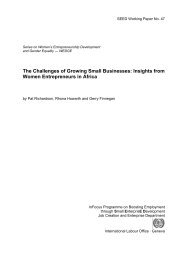manual: women workers' rights and gender equality - International ...
manual: women workers' rights and gender equality - International ...
manual: women workers' rights and gender equality - International ...
You also want an ePaper? Increase the reach of your titles
YUMPU automatically turns print PDFs into web optimized ePapers that Google loves.
Chapter 4<br />
Fundamental Rights in Life <strong>and</strong> at Work<br />
Introduction<br />
In this chapter you find sessions about fundamental <strong>rights</strong> at work <strong>and</strong> in life.<br />
The chapter starts with a session about the different types of <strong>rights</strong> for Cambodians, like<br />
fundamental human <strong>rights</strong>, constitutional <strong>rights</strong> <strong>and</strong> national <strong>rights</strong>. This session can be used as a<br />
starting point for all types of training about <strong>rights</strong>.<br />
It is followed by a session about the fundamental <strong>rights</strong> at work in general. The four fundamental<br />
<strong>rights</strong> at work are worked out in more detail in the sessions 4.3 to 4.7:<br />
1. no to discrimination, yes to <strong>equality</strong> (4.3)<br />
2. no to suppression of freedom for workers to organize (4.4)<br />
3. no to child labour, yes to education (4.5 <strong>and</strong> 4.6)<br />
4. no to forced labour, yes to free labour (4.7)<br />
In the other sessions attention is paid to the <strong>rights</strong> of different groups of workers, like homeworkers<br />
or migrant workers <strong>and</strong> to specific topics that are of importance to especially <strong>women</strong> workers.<br />
Issues covered are for instance: workers with family responsibilities, overtime <strong>and</strong> maternity<br />
protection. There are also a number of sessions that pay attention to different forms of violence<br />
against <strong>women</strong> <strong>and</strong> to their reproductive health <strong>rights</strong>.<br />
Most sessions can be done with both formal <strong>and</strong> informal sector workers. However, some sessions<br />
are only appropriate for formal sector workers, i.e. those workers protected by the Labour Code<br />
1997. Therefore, check the intended target group for each session.<br />
Learning objectives<br />
After the sessions participants should be more aware about:<br />
• The basic <strong>rights</strong> they have as human beings <strong>and</strong> Cambodian citizens<br />
• The responsibilities they have as citizens regarding their <strong>rights</strong><br />
• Where to go with legal problems<br />
• Dealing with the police<br />
• The fundamental <strong>rights</strong> at work<br />
• How to fight in<strong>equality</strong> issues at work<br />
• The right to organize<br />
• The specific <strong>rights</strong> of children <strong>and</strong> youth<br />
• Child labour<br />
• Forced labour<br />
• Sexual harassment<br />
• Maternity protection<br />
• Occupational safety <strong>and</strong> health<br />
• Home work<br />
• Problems migrant workers can face<br />
• Rights on the following issues:<br />
- Violence against <strong>women</strong><br />
- Rape <strong>and</strong> abortion<br />
- Trafficking of <strong>women</strong> <strong>and</strong> children<br />
46

















